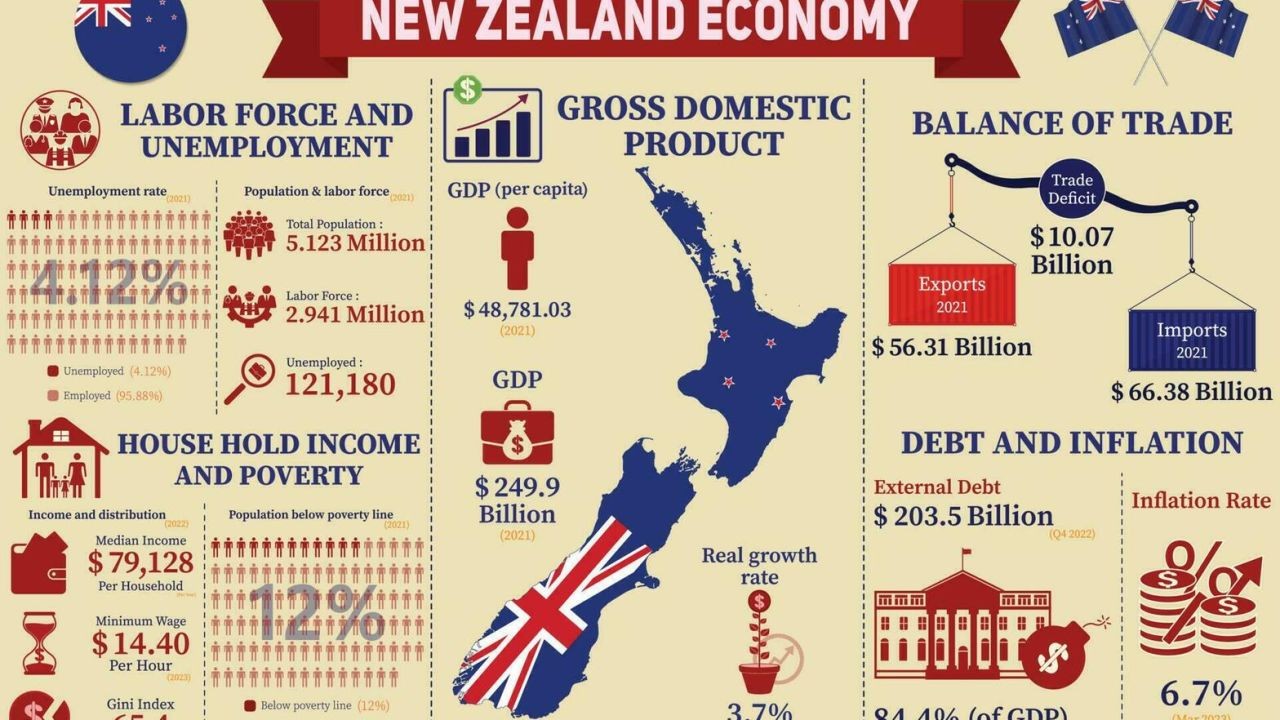New Zealand's enchanting landscapes and rich cultural tapestry have historically drawn tourists from around the globe. Yet, as the country navigates the post-pandemic economic landscape, the question arises: Can New Zealand's economy continue to thrive on tourism alone? With tourism representing a significant portion of the national GDP, the stakes are high. This article delves into the intricate relationship between tourism and the Kiwi economy, scrutinizing its sustainability and potential for future growth.
Historical Evolution of New Zealand's Tourism Sector
Tourism has long been a cornerstone of New Zealand's economic framework. In 2019, the tourism sector contributed approximately 5.8% to the national GDP, according to Stats NZ. However, the COVID-19 pandemic disrupted this trajectory, leading to substantial losses and necessitating government intervention. The government's decision to invest NZD 400 million in a tourism recovery package underscored the sector's importance, yet also highlighted its vulnerabilities.
Data-Driven Insights: Tourism's Economic Impact
Recent data from the Ministry of Business, Innovation and Employment (MBIE) reveals that international tourist arrivals surged by 30% in 2022 compared to the previous year. This rebound showcases the resilience of New Zealand's tourism industry, yet questions remain about its long-term sustainability. The reliance on international visitors poses risks, especially given global uncertainties such as geopolitical tensions and climate change-related disruptions.
Case Study: Queenstown's Economic Transformation
Problem: Queenstown, famed for its adventure tourism, faced a severe downturn during the COVID-19 pandemic. The town's economy, heavily reliant on international tourism, witnessed a 60% decline in visitor numbers, leading to widespread job losses.
Action: In response, local businesses pivoted to attract domestic tourists. The "Do Something New, New Zealand" campaign, backed by Tourism New Zealand, encouraged Kiwis to explore their backyard, reinvigorating the local economy.
Result: By mid-2022, domestic tourism in Queenstown had increased by 45%, offsetting some of the losses from international markets. This shift not only stabilized the local economy but also fostered a renewed appreciation for domestic travel.
Takeaway: Queenstown's experience underscores the need for diversification within the tourism sector. New Zealand businesses can apply similar strategies to mitigate risks associated with over-dependence on international visitors.
Pros and Cons of Tourism-Driven Growth
While tourism offers numerous economic benefits, it also comes with inherent challenges. Understanding these dynamics is crucial for making informed decisions.
Pros:
- Economic Boost: Tourism generates significant revenue, supporting businesses and creating jobs across various sectors.
- Infrastructure Development: Increased tourist inflow often leads to improved infrastructure, benefiting local communities.
- Cultural Exchange: Exposure to diverse cultures enriches the local community and fosters global understanding.
Cons:
- Environmental Impact: High tourist numbers can strain natural resources and lead to environmental degradation.
- Economic Vulnerability: Over-reliance on tourism makes the economy susceptible to external shocks.
- Job Insecurity: Many jobs in the tourism sector are seasonal, leading to employment instability.
Debunking Tourism Myths
Myth: "Tourism alone can sustain New Zealand's economy." Reality: While tourism is vital, diversification into sectors like technology and agriculture is essential for economic stability. A report from the Reserve Bank of New Zealand emphasizes the importance of enhancing productivity across various industries.
Myth: "Domestic tourism cannot substitute international visitors." Reality: As demonstrated by Queenstown's success, domestic tourism can significantly contribute to the economy, especially when coupled with targeted marketing strategies.
Future Trends and Predictions
Looking forward, New Zealand's tourism sector must adapt to changing global dynamics. According to a 2023 report from Deloitte, sustainable tourism practices are expected to become a major focus. By 2028, eco-tourism could constitute up to 50% of all tourism activities in New Zealand, driven by increasing consumer awareness and environmental policies.
Conclusion
While tourism remains a vital component of New Zealand's economic engine, its long-term sustainability hinges on diversification and innovation. By embracing sustainable practices and leveraging domestic tourism, New Zealand can bolster its economic resilience. As the nation looks to the future, strategic investments in diverse sectors will be crucial in ensuring economic stability and growth.
What are your thoughts on the future of New Zealand's tourism industry? Share your insights in the comments below!
Frequently Asked Questions (FAQ)
How does tourism impact New Zealand's economy? Tourism significantly contributes to New Zealand's GDP, supporting various sectors and creating jobs. However, its reliance on international visitors poses risks.
What are the biggest misconceptions about New Zealand's tourism sector? A common myth is that tourism alone can sustain the economy. In reality, diversification into other sectors is essential for long-term stability.
What strategies can enhance New Zealand's tourism sustainability? Adopting eco-friendly practices and focusing on domestic tourism can enhance sustainability. Strategic marketing and infrastructure investments are also crucial.
Related Search Queries
- New Zealand tourism economic impact
- Sustainable tourism practices in NZ
- Queenstown tourism recovery strategies
- Future of NZ tourism industry
- Tourism diversification in New Zealand
































toneylazar7124
9 months ago